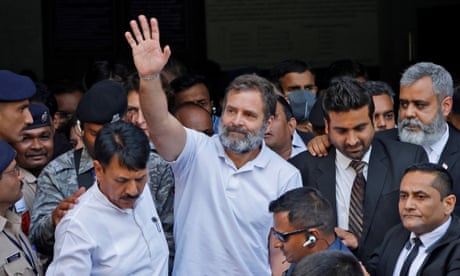Gandhi was found guilty of defamation in March for a speech he gave in 2019 in which he associated Narendra Modi with two notorious criminals.
Following Gandhi's remark, Purnesh Modi, a lawmaker from Modi's native Gujarat, filed a lawsuit in court, claiming that Gandhi's speech had insulted and defamed all people with the last name Modi across the nation.
After nearly two years of inactivity, the matter was reopened earlier this year, and Gandhi was found guilty of slander in March. Gandhi received the harshest punishment, a two-year prison sentence, which the judge attributed to the fact that Gandhi's "status as a parliamentarian" made his remarks more well-known and, hence, more severe.
Gandhi was granted 30 days bail after the ruling. He immediately filed an appeal, calling the sentence “harsh and excessive”, arguing that the case was “politically motivated” and that a “cloak of defamation” had been used as a means to get him expelled from parliament.
Gandhi’s lawyers have also argued that the 130 million people called Modi in India are not one collective group that can be defamed and that the sentence was based on “conjecture not evidence”.
The refusal by the courts to give Gandhi relief in the case could signal that he faces an uphill battle in getting the courts to overturn the verdict through appeal. Many in the Congress party expect the fight to go all the way up to the supreme court.
Opposition figures and critics have said the defamation case against Gandhi is being used as part of an attack on opposition parties by the BJP and symptomatic of an increasingly politicized judiciary.
Many pointed out that the defamation case against Gandhi only began to gather pace this year, just as he was drawing public attention to prime minister Modi’s links to Indian billionaire industrialist Gautam Adani, whose company was recently accused of committing the “largest corporate con in history.” The company has issued a lengthy rebuttal of the allegations.
While out on bail, Gandhi has continued to be politically vocal and this week has been out on the campaign trail in Karnataka, where Congress is fighting to topple the BJP in the state elections next month. “The BJP think I can be intimidated with disqualification but I am not scared,” Gandhi told a rally earlier this week.




0 Comments
If you have any doubts please let me know thankyou